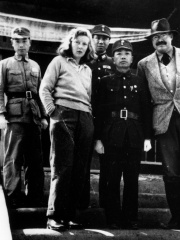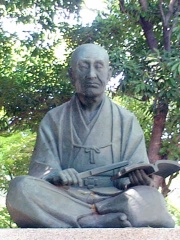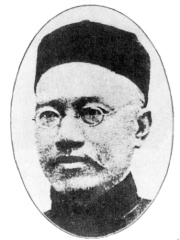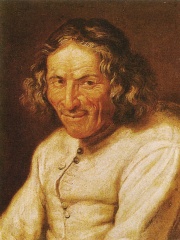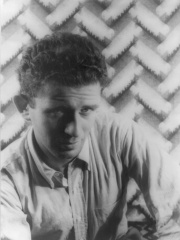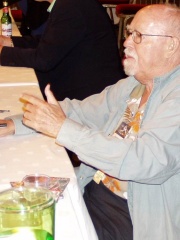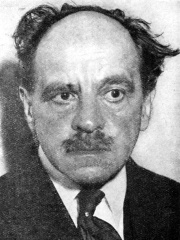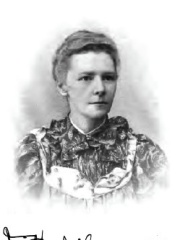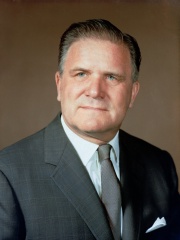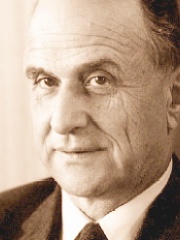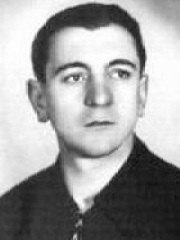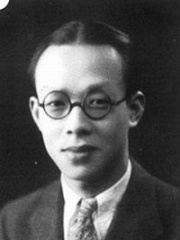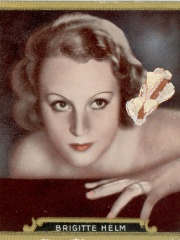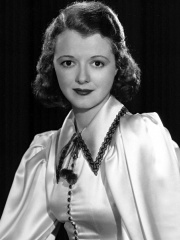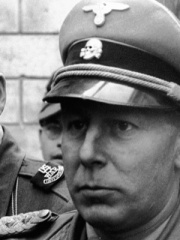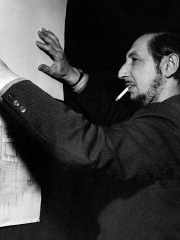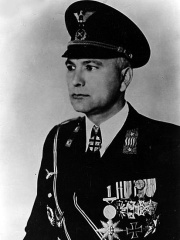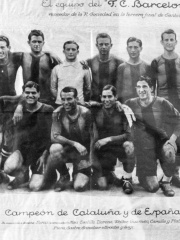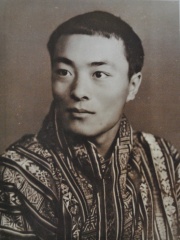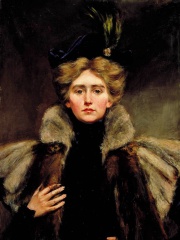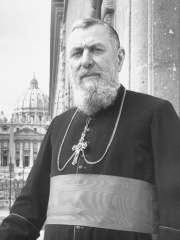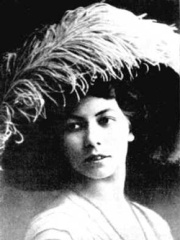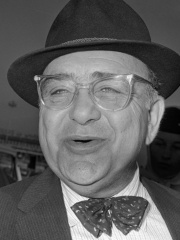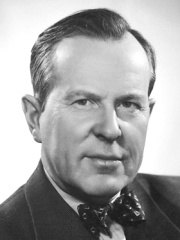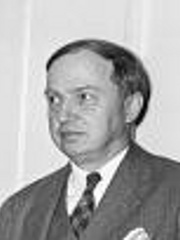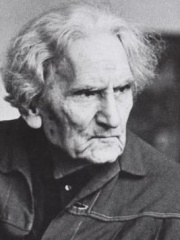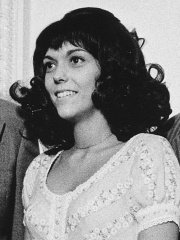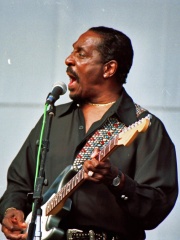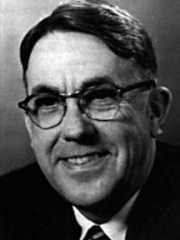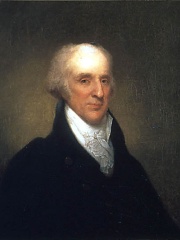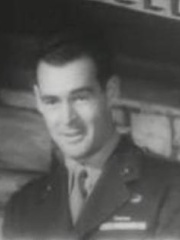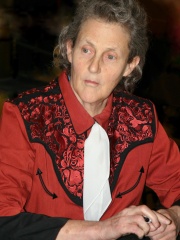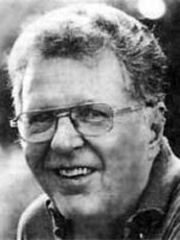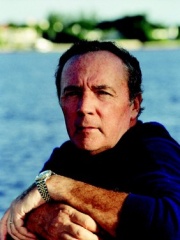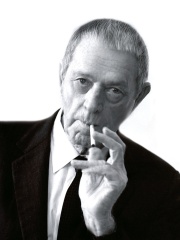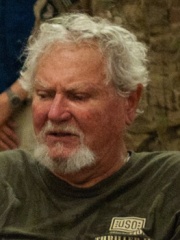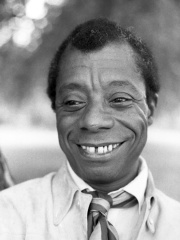WRITER
Fredric Brown
1906 - 1972
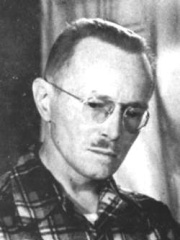
 Fredric Brown
Fredric Brown
Fredric Brown (October 29, 1906 – March 11, 1972) was an American science fiction, fantasy, and mystery writer. He is known for his use of humor and for his mastery of the "short short" form—stories of one to three pages, often with ingenious plotting devices and surprise endings. Humor and a postmodern outlook carried over into his novels as well. One of his stories, "Arena", was adapted into a 1967 episode of the American television series Star Trek. Read more on Wikipedia
His biography is available in 33 different languages on Wikipedia. Fredric Brown is the 1,352nd most popular writer (down from 1,132nd in 2024), the 1,969th most popular biography from United States (down from 1,336th in 2019) and the 157th most popular American Writer.
Fredric Brown is most famous for his mystery novels, which often featured a protagonist who is a detective.
Memorability Metrics
Page views of Fredric Brown by language
Among WRITERS
Among writers, Fredric Brown ranks 1,352 out of 7,302. Before him are Martha Gellhorn, Chikamatsu Monzaemon, Ken Robinson, Yan Fu, Ibrahim ibn Yaqub, and Paul Scarron. After him are David C. H. Austin, Norman Mailer, Harry Harrison, Jakob Wassermann, Ethel Voynich, and Matteo Maria Boiardo.
Most Popular Writers in Wikipedia
Go to all RankingsMartha Gellhorn
1908 - 1998
HPI: 66.03
Rank: 1,346
Chikamatsu Monzaemon
1653 - 1725
HPI: 66.03
Rank: 1,347
Ken Robinson
1950 - 2020
HPI: 66.03
Rank: 1,348
Yan Fu
1854 - 1921
HPI: 66.02
Rank: 1,349
Ibrahim ibn Yaqub
912 - 966
HPI: 66.01
Rank: 1,350
Paul Scarron
1610 - 1660
HPI: 66.00
Rank: 1,351
Fredric Brown
1906 - 1972
HPI: 66.00
Rank: 1,352
David C. H. Austin
1926 - 2018
HPI: 65.99
Rank: 1,353
Norman Mailer
1923 - 2007
HPI: 65.98
Rank: 1,354
Harry Harrison
1925 - 2012
HPI: 65.98
Rank: 1,355
Jakob Wassermann
1873 - 1934
HPI: 65.98
Rank: 1,356
Ethel Voynich
1864 - 1960
HPI: 65.98
Rank: 1,357
Matteo Maria Boiardo
1441 - 1494
HPI: 65.96
Rank: 1,358
Contemporaries
Among people born in 1906, Fredric Brown ranks 80. Before him are Yasuo Haruyama, Douglas McGregor, James E. Webb, Nelson Goodman, Gusztáv Sebes, and Zhou Youguang. After him are Brigitte Helm, Shigemaru Takenokoshi, Janet Gaynor, Jacques Becker, Walter Rauff, and Carlo Scarpa. Among people deceased in 1972, Fredric Brown ranks 48. Before him are Ferdinand Čatloš, Louis Leakey, Josep Samitier, Jigme Dorji Wangchuck, Natalie Clifford Barney, and Eugène Tisserant. After him are Bronislava Nijinska, Akim Tamiroff, Jo Bonnier, Lester B. Pearson, Harlow Shapley, and Martiros Saryan.
Others Born in 1906
Go to all RankingsYasuo Haruyama
SOCCER PLAYER
1906 - 1987
HPI: 66.65
Rank: 74
Douglas McGregor
ECONOMIST
1906 - 1964
HPI: 66.50
Rank: 75
James E. Webb
POLITICIAN
1906 - 1992
HPI: 66.36
Rank: 76
Nelson Goodman
PHILOSOPHER
1906 - 1998
HPI: 66.13
Rank: 77
Gusztáv Sebes
SOCCER PLAYER
1906 - 1986
HPI: 66.11
Rank: 78
Zhou Youguang
ECONOMIST
1906 - 2017
HPI: 66.07
Rank: 79
Fredric Brown
WRITER
1906 - 1972
HPI: 66.00
Rank: 80
Brigitte Helm
ACTOR
1906 - 1996
HPI: 65.99
Rank: 81
Shigemaru Takenokoshi
SOCCER PLAYER
1906 - 1980
HPI: 65.92
Rank: 82
Janet Gaynor
ACTOR
1906 - 1984
HPI: 65.83
Rank: 83
Jacques Becker
FILM DIRECTOR
1906 - 1960
HPI: 65.76
Rank: 84
Walter Rauff
MILITARY PERSONNEL
1906 - 1984
HPI: 65.66
Rank: 85
Carlo Scarpa
ARCHITECT
1906 - 1978
HPI: 65.44
Rank: 86
Others Deceased in 1972
Go to all RankingsFerdinand Čatloš
POLITICIAN
1895 - 1972
HPI: 66.97
Rank: 42
Louis Leakey
ARCHAEOLOGIST
1903 - 1972
HPI: 66.51
Rank: 43
Josep Samitier
SOCCER PLAYER
1902 - 1972
HPI: 66.32
Rank: 44
Jigme Dorji Wangchuck
POLITICIAN
1929 - 1972
HPI: 66.30
Rank: 45
Natalie Clifford Barney
WRITER
1876 - 1972
HPI: 66.22
Rank: 46
Eugène Tisserant
RELIGIOUS FIGURE
1884 - 1972
HPI: 66.08
Rank: 47
Fredric Brown
WRITER
1906 - 1972
HPI: 66.00
Rank: 48
Bronislava Nijinska
DANCER
1891 - 1972
HPI: 65.97
Rank: 49
Akim Tamiroff
ACTOR
1899 - 1972
HPI: 65.78
Rank: 50
Jo Bonnier
RACING DRIVER
1930 - 1972
HPI: 65.68
Rank: 51
Lester B. Pearson
POLITICIAN
1897 - 1972
HPI: 65.61
Rank: 52
Harlow Shapley
ASTRONOMER
1885 - 1972
HPI: 65.52
Rank: 53
Martiros Saryan
PAINTER
1880 - 1972
HPI: 65.49
Rank: 54
In United States
Among people born in United States, Fredric Brown ranks 1,969 out of 20,380. Before him are Karen Carpenter (1950), Ike Turner (1931), Michael Spence (1943), Arthur Samuel (1901), John Armstrong Jr. (1758), and Griffin Dunne (1955). After him are Georgina Spelvin (1936), Robert Ryan (1909), Norman Mailer (1923), Harry Harrison (1925), Temple Grandin (1947), and Matt Bomer (1977).
Others born in United States
Go to all RankingsKaren Carpenter
SINGER
1950 - 1983
HPI: 66.01
Rank: 1,963
Ike Turner
MUSICIAN
1931 - 2007
HPI: 66.01
Rank: 1,964
Michael Spence
ECONOMIST
1943 - Present
HPI: 66.01
Rank: 1,965
Arthur Samuel
COMPUTER SCIENTIST
1901 - 1990
HPI: 66.01
Rank: 1,966
John Armstrong Jr.
POLITICIAN
1758 - 1843
HPI: 66.01
Rank: 1,967
Griffin Dunne
ACTOR
1955 - Present
HPI: 66.00
Rank: 1,968
Fredric Brown
WRITER
1906 - 1972
HPI: 66.00
Rank: 1,969
Georgina Spelvin
PORNOGRAPHIC ACTOR
1936 - Present
HPI: 65.99
Rank: 1,970
Robert Ryan
ACTOR
1909 - 1973
HPI: 65.99
Rank: 1,971
Norman Mailer
WRITER
1923 - 2007
HPI: 65.98
Rank: 1,972
Harry Harrison
WRITER
1925 - 2012
HPI: 65.98
Rank: 1,973
Temple Grandin
BIOLOGIST
1947 - Present
HPI: 65.98
Rank: 1,974
Matt Bomer
ACTOR
1977 - Present
HPI: 65.96
Rank: 1,975
Among WRITERS In United States
Among writers born in United States, Fredric Brown ranks 157. Before him are Natalie Clifford Barney (1876), Samuel R. Delany (1942), Walter M. Miller Jr. (1923), Diana Gabaldon (1952), Nora Roberts (1950), and Martha Gellhorn (1908). After him are Norman Mailer (1923), Harry Harrison (1925), James Patterson (1947), Erskine Caldwell (1903), Clive Cussler (1931), and James Baldwin (1924).
Natalie Clifford Barney
1876 - 1972
HPI: 66.22
Rank: 151
Samuel R. Delany
1942 - Present
HPI: 66.20
Rank: 152
Walter M. Miller Jr.
1923 - 1996
HPI: 66.12
Rank: 153
Diana Gabaldon
1952 - Present
HPI: 66.09
Rank: 154
Nora Roberts
1950 - Present
HPI: 66.08
Rank: 155
Martha Gellhorn
1908 - 1998
HPI: 66.03
Rank: 156
Fredric Brown
1906 - 1972
HPI: 66.00
Rank: 157
Norman Mailer
1923 - 2007
HPI: 65.98
Rank: 158
Harry Harrison
1925 - 2012
HPI: 65.98
Rank: 159
James Patterson
1947 - Present
HPI: 65.83
Rank: 160
Erskine Caldwell
1903 - 1987
HPI: 65.82
Rank: 161
Clive Cussler
1931 - 2020
HPI: 65.82
Rank: 162
James Baldwin
1924 - 1987
HPI: 65.75
Rank: 163
